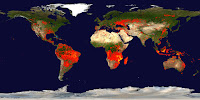One strategy with implications for climate-treaty talks, Lindon N. Pronto, a young former federal wildland firefighter from California writes, is using controlled fires to cut chances of more intense blazes that emit far more short-term greenhouse gases and degrade ecosystems.
The piece is timely given how much uncontrolled fires have been in the news of late, from the American West to Indonesia, where President Joko Widodo just expressed regret to Malaysia over the resulting harmful haze.
...
Fires have been largely excluded from the climate change discussions, but fortunately this is changing to include consideration of fire as both a consequence and driver of climate change.
In the tropics, fire has been used to manage and tame landscapes through most of human history. But the scale of burning, particularly in Indonesia, has made fire's environmental impacts an international issue, both by sending dangerous haze across borders and adding to the global buildup of heat-trapping greenhouse gases warming the climate.
...
With a much-anticipated round of climate treaty negotiations starting in Paris on Nov. 30, scientists and fire management specialists are strongly considering the gains in integrating improved fire management practices into climate related agreements and policies.
...
Here's why this could help slow global warming. Global vegetation fire emissions typically constitute a third of total releases of carbon dioxide, the main heat-trapping emission, annually. For example, fires burning in Indonesia alone during the potent El Niño event[s] in 1997 and 1998 produced the equivalent of up to 40 percent of the global gross carbon dioxide emissions from fossil fuels for that year.
Read more at How to Manage Fire to Cut Pollution and Slow Climate Change

No comments:
Post a Comment